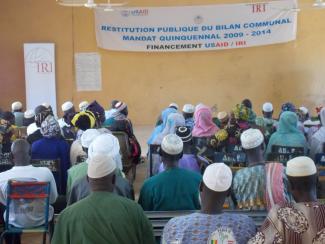November 2015—For decades, elected officials in Mali would finish their terms without accounting for their actions to their constituents. Following the 2012 political crisis in Mali, the citizenry, elected officials and civil society recognized that this had to change.
As a result, communal councils were established—bringing together administrative officials, civil society representatives and citizens to evaluate mayors’ work through a process called the “end-of-mandate assessment.”
With USAID funding, the International Republican Institute and its local partners supported mayors in 18 communes to increase citizen engagement and improve government accountability through the assessments. Administrative authorities and locally elected representatives received training to engage citizens and civil society in the assessments, which were held in Segou, Sikasso, Bamako, Koulikoro, Kayes, Gao, Timbuktu and Kidal communes from December 2014 through August 2015.
Selection of the targeted communes was based on their social cohesion, geographical accessibility, and experience with public debate. Seventy-nine local officials took part in the end-of-mandate process.
As part of the assessments, steering committees coordinated public debates on local development plans, providing both the municipal council and local authorities an opportunity to highlight the municipality’s strengths and weaknesses, and their action plans to address issues.
In some communities, mayors embraced this effort with innovation and creativity. They engaged local radio stations to air the debates live to inform citizens about how elected officials served their communities during their five-year term in office. Radio stations’ listenership skyrocketed during these public debates as the programs reached the broader population that could not attend the debates.
As a result of USAID’s support, citizens walked away with a greater sense of engagement with their elected officials, better knowledge of what their tax money was being used for, and the importance of accountability.
Halle Ousmane, the mayor of Timbuktu since 2009, remarked that the “EMA [end-of-mandate assessment] held in Timbuktu [on Jan. 31, 2015] was an important forum to inform [the] population in Timbuktu about our achievements and the problems we faced to roll out our plan. For example, most people didn’t know that we paid the water and energy bills of Timbuktu mosques and churches. Also, it was an opportunity for constituents to voice their concerns and provide feedback on municipal council planning.” He added that “I appreciate the great interactions between the communal council and the citizens.”
LINKS
Follow @USAIDMali, on Facebook
,“Most people didn’t know that we paid the water and energy bills of Timbuktu mosques and churches.”

